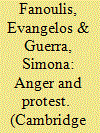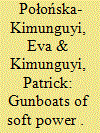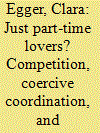|
|
|
Sort Order |
|
|
|
Items / Page
|
|
|
|
|
|
|
| Srl | Item |
| 1 |
ID:
158437


|
|
|
|
|
| Summary/Abstract |
The public image of the European Union (EU) has met increasingly negative evaluations since the economic and financial crisis hit its peak. Although opposition towards the EU has been pitched as a temporary phenomenon, it has now become a distinctive characteristic of European integration, described as ‘embedded’. Recent analyses on citizens’ attitudes towards the EU underline a rational utilitarian dimension, stressing that EU attachment is affected by future life expectations. Are rationalist perspectives the only possible explanation behind the rise of Euroscepticism, though? This article offers an alternative approach, by using discourse analysis, and examines how emotions, as embedded in Eurosceptic discursive frames and practices, may affect attitudes towards the EU. We argue that an analysis of citizens’ opposition through emotions when the salience of the EU increases can show how a Eurosceptic emotion-laden public discourse may become prominent at the domestic level.
|
|
|
|
|
|
|
|
|
|
|
|
|
|
|
|
| 2 |
ID:
158438


|
|
|
|
|
| Summary/Abstract |
As Britain prepares to leave the European Union after the popular vote of June 2016, the government is embarking on the revision of foreign policy. Boris Johnson, or ‘just Boris’, has been entrusted with forging the new ‘Global Britain’ for the post-Brexit era and reinventing British economy around new relationships. Boris has a track record of misrepresenting and offending foreign peoples, leaders and countries. This article assesses the prospects for Africa in Johnson’s vision for ‘Global Britain’ as presented in his foreign policy speeches. The paper unpacks Johnson’s discursive construction of ‘Africa’ and inserts it into a broader historical and political context of British relations with Africa. It argues that, by constructing Africa as a ‘problem’ and offering liberal values as a condition for development, Johnson is continuing British imperial and post-colonial discourses of ‘developing’ or ‘civilizing’ Africa. In the post-Brexit world of a changing global balance of power, democratic conditionality serves to sustain and reproduce British forms of power and policies.
|
|
|
|
|
|
|
|
|
|
|
|
|
|
|
|
| 3 |
ID:
158441


|
|
|
|
|
| Summary/Abstract |
This article starts from the premise that, due to a lack of dedicated incentives as well as the size of the population, International Non-Governmental Oragnzations (INGOs) are more likely to compete than to cooperate. Drawing upon collective action and principal-agent theories, this research provides a field-level perspective on INGOs’ cooperative strategies. Building on an analysis of two very diverse cases (human rights protection in Kosovo and humanitarian activities in Somalia), data collected through field research have led to a distinction between coordination, which depends on the provision of incentives and constraints by donors, and cooperation, which relies on trust and on pursuing common interests among INGO members. Overall, it appears that INGOs pursue a creative mix of strategies: competition, formal coercive coordination and informal trust-based cooperation. This paper concludes with a discussion of the results through the insights they provide on issues related to the fragmentation, efficiency and inclusiveness of the crisis response.
|
|
|
|
|
|
|
|
|
|
|
|
|
|
|
|
| 4 |
ID:
158440


|
|
|
|
|
| Summary/Abstract |
How did the rise of nationalism affect patterns of interstate wars? The conventional wisdom in mainstream security studies tends to treat the rise of nationalism as a ‘force amplifier’ that allowed states to wage war on an unprecedented scale, leading to deadlier—and, consequently, less frequent—wars. By building on emerging interdisciplinary research on territory and territoriality, this essay suggests that there was a second mechanism—complementary to the ‘force amplifier’ logic—through which the rise of nationalism affected the patterns of interstate war: nationalism changed the ‘character’ of territories in the modern state system, which, in turn, transformed state preferences over their territorial belongings. Before the rise of nationalism, state elites viewed their territories more as ‘divisible’ goods, which created strong incentives for states to wage frequent yet limited wars. The rise of nationalism, in this context, rendered territory controlled by a state more of an ‘inviolable homeland’, which then contributed to the increasing severity and decreasing frequency of interstate wars. The arguments presented in this essay have implications for not only the study of nationalism and war, but also bargaining models of war and the so-called ‘border fixity’ norm.
|
|
|
|
|
|
|
|
|
|
|
|
|
|
|
|
| 5 |
ID:
158439


|
|
|
|
|
| Summary/Abstract |
The classical narrative of the historical evolution of a pluralist international society emphasizes its European origins: emerging in Europe and then progressively expanding worldwide via European colonialism. It is a narrative that is based on particular dualities, such as those of international system and society and sovereignty/anarchy and hierarchy. These dualities create a dichotomy within the classical narrative between an ostensibly pluralist, European international society and the world beyond it, largely insulating its depictions of the evolution of the norms and institutions of the former from the hierarchies and empires of the latter. This article advances a different narrative of the evolution of pluralism within international society, suggesting that pluralism has only been reflected in the practices of the society of states since decolonization. Even after decolonization, there have been continued exceptions and violations to pluralist norms, signifying a contemporary international society that is both pluralist and hierarchical.
|
|
|
|
|
|
|
|
|
|
|
|
|
|
|
|
|
|
|
|
|